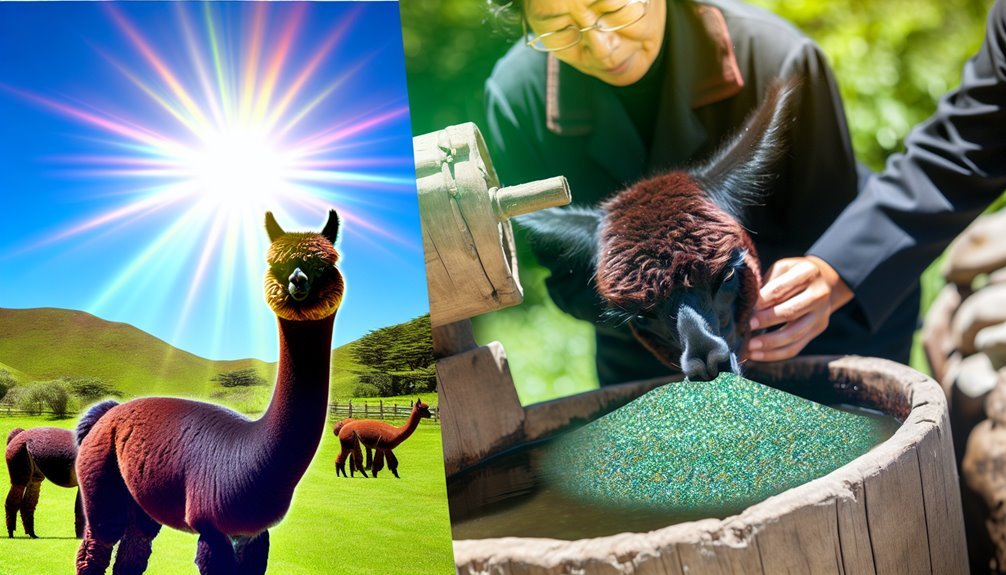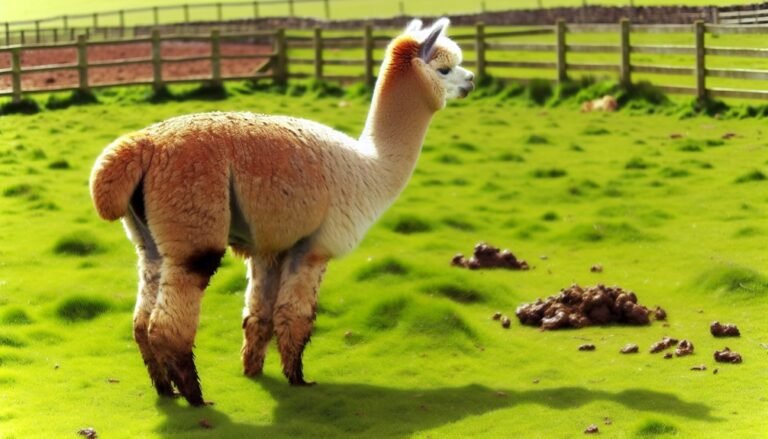Top 3 Ways to Prevent Alpaca Vitamin Deficiency
To prevent vitamin deficiency in your alpacas, make sure they get plenty of sunlight since it’s essential for vitamin D production. Supplement their diet with balanced nutrients, especially during low pasture seasons, focusing on proteins, minerals, and vitamin D. Also, keep an eye on their body condition and overall health to catch any early signs of deficiency. If you want to keep your alpacas in peak shape, there are several important steps and details you’ll want to explore further.
Key Takeaways
- Ensure alpacas receive regular sunlight exposure for natural vitamin D synthesis, especially during winter and in dark-fleeced animals.
- Provide balanced nutrition with adequate protein and mineral supplementation, including vitamin D and selenium during low-sunlight seasons.
- Regularly monitor body condition, health, and perform blood tests to detect and address early signs of vitamin deficiencies.
- Manage grazing by rotating pastures, avoiding overgrazing, and ensuring access to sunny areas to enhance vitamin absorption.
- Maintain a clean, uncontaminated water supply to support nutrient uptake and overall health.
Ensure Adequate Sunlight Exposure

Because alpacas need sunlight to produce vitamin D naturally, it’s essential to provide them with regular exposure, especially during winter when sunlight is scarce. You should focus on managing their grazing strategies to maximize sunlight exposure, particularly for dark-fleeced alpacas, which are more prone to vitamin deficiency due to fleece blocking sunlight. Monitoring pasture production and ensuring alpacas spend time in sunny areas helps prevent rickets and supports overall herd health. Smoky conditions can reduce sunlight, so adjusting grazing plans during such periods is important. While supplementation can help, prioritizing natural sunlight exposure remains key. By implementing rotational grazing that encourages time in sunny pastures, you’ll reduce the risk of vitamin D deficiency and maintain your alpacas’ well-being effectively.
Provide Balanced Nutritional Supplementation
While natural sunlight is essential, you’ll also need to provide balanced nutritional supplementation to keep your alpacas healthy. Focus on offering a diet with 10-16% crude protein for adults and 12-16% for growing or lactating females to meet their specific nutrition needs. Regularly assess pasture production and stocking rates to avoid mineral deficiencies caused by overgrazing or poor-quality forage. Supplement with hay or commercial feeds when pasture falls short. Vitamin D supplementation is vital, especially in autumn, winter, and spring, to prevent rickets, particularly in darker-fleeced alpacas. Don’t forget selenium supplements, as deficiencies are common in many soils. Always provide clean water to support nutrient absorption and overall health. Tailor feeding strategies to your alpacas’ age and condition to optimize their wellbeing and prevent vitamin-related issues.
Regularly Monitor Body Condition and Health
Although proper nutrition is essential, regularly monitoring your alpacas’ body condition and overall health is just as important to prevent vitamin deficiencies. On a regular basis, assess their body condition using a scale from 1 to 5 to identify undernourished animals early and implement timely nutritional interventions. Consistent health assessments help you monitor for internal parasites and other issues that can impair nutrient absorption. Periodic blood sampling is valuable to evaluate the effectiveness of supplementation, especially for key minerals like cobalt, copper, and zinc. Tracking growth rates in crias guarantees they’re thriving and receiving adequate nutrition. Don’t forget to keep detailed health care records; these help you spot patterns indicating potential vitamin deficiencies. By staying vigilant and proactive, you can safeguard your alpacas’ health and prevent deficiencies before they become serious problems.
Frequently Asked Questions
What Vitamin Deficiency Do Alpacas Have?
You’ll find vitamin D deficiency common in alpacas, impacting health with symptoms like lameness. Focus on alpaca nutrition by adjusting dietary vitamin sources, hay quality, mineral balance, and seasonal needs, while seeking veterinary advice for best results.
How to Prevent Vitamin Deficiency in Chickens?
Did you know up to 30% of chickens face poor egg production due to vitamin deficiency? You’ll guarantee flock health by balancing chicken feed, vitamin sources, calcium needs, sunlight exposure, quality forage, and timely supplements for disease prevention.
What Supplements Do Alpacas Need?
You’ll need to focus on alpaca nutrition by providing essential minerals and vitamin sources through supplement types tailored to dietary balance. Maintain feeding schedules, monitor health and fiber quality, support digestive health, and manage pasture effectively for best results.
How Often Do Alpacas Need Vitamin D?
You might think alpacas need vitamin D daily, but frequency depends on sunlight exposure, seasonal changes, and pasture quality. For breeding considerations and health monitoring, supplement options vary—injectables often suit autumn to spring better than feed types or dietary sources.








Our picks
Alpaca & Wool Felted Sole Inserts: Comfy Upgrade?
Best Alpaca Socks for Hiking: Ultimate Comfort and Durability on Trails
Best Alpaca Halter for Comfort and Control